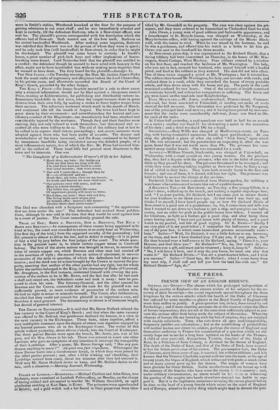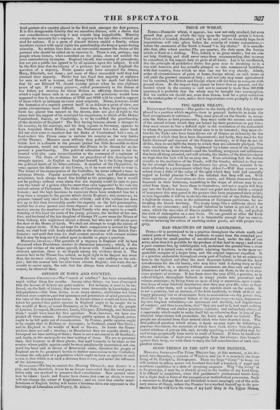FRENCH VIEW Of AN ENGLISH REGENCY.
THE PRESS.
JouttNai. DES DEHA.TS—The alarms which the prolonged indisposition of the King excites in England—the sincere wishes of his subjects for time re- covery of their Sovereign—the secret inquietude spread throughout the three kingdoms by the serious attacks which time health of the Duke of Clarence has suffered for some months—a glance at the Royal Family of England will more than suffice to justify. A great question has, in fact, been raised by sad forebodings; and if more cheering accounts do at this moment soften the effect of former impressions, they are not at the same time sufficiently effaced to pre- vent this serious affair from being made the subject of discussion. When the chances of human life are hound tip with the fate of empires, they are weighed with double solicitude. Time, who cuts down all ages undistinguishably, frequently justifies our calculations ; but as the establishing of probabilities will neither hasten nor direct his strokes, perhaps the alarms of England may themselves authcirize in France the examination of a question which we sin- cerely hope not to see for a long time agitated on the banks of the Thames. A child of nine years old, Alexandrina Victoria, daughter of the Duke of Kent, by a Princess or Saxe Coburg, is destined for the throne of England. The death of the Duke of Kent, and that of the Duke of York, have assured to her the future possession of the crown. The presumptive heir, the Duke Of Clarence, sixty-three years of age, is married, but without children ; and it is known that the Princess Charlotte carried with her into time tomb, at the age of twenty years, the hopes of England, which witnessed with pride so much virtue and so many graces grow up for the throne. The reigns of women have been glorious for Great Britain. Noble recollections still are bound up with the memory of the females who have worn the crown in that country ; and, under ordinary circumstances, no alarm would be felt tht:re at witnessing the passing of the sceptre into hands elsewhere deemed too feeble to sup- port it. But it is the legitimate uneasiness at seeing the crown placed before its time on the head of a young female which seizes on the mind of England and of Europe attentive to every thing which might tend to disturb the poll-
tical posture of a country placed in the first rank amongst the first powers. It is this disagreeable futurity that we ourselves discuss, with a desire that ow considerations respecting it may remain long inapplicable. Minority creates the necessity for a regency. A regency is but too often a critical pe- riod for nations. It is a germ of discord thrown amidst a family, whose members contest with equal rights the guardianship of a king or queen during minority. No written laws fixes in an irrevocable manner the choice of the persons who should be called on to exercise it. There is not, perhaps, any people whose history, when consulted on the point, does not exhibit the most contradictory examples. .England herself, that country of precedents, has not yet a public law agreed to by all opinions upon this subject. It will be the first time that the infancy of a princess has raised in England the question of a regency. Three queens only have occupied the throne, Mary, Elizabeth, and Anne ; and none of these succeeded until they had attained their majority. Public law has fixed that majority at eighteen for men as well as women and Henry VIII. on his death had decided that his son Edward VI. should assume power when he was eighteen years of age. If a young princess, called prematurely to the throne of her father, yet reserves for Great Britain an afflicting discussion from which a regal house rich in so many princes and princesses would have appeared to free it, the resolutions of 1788 and 1810 will be cited in support of those which so unhappy an event must originate. Never, however, could the formation of a regency present itself in so delicate a point of view, nor under circumstances more difficult. Since then, in fact, the prince, whose birth has placed him nearest to the .throne, does not give of right to the minor heir the support of his mind and his experience, to which of the Dukes Cumberland, Sussex, or Cambridge, is to be confided the guardianship of the destinies of England ? The first having become almost a stranger to his country, by his marriage, and his long sojourn in Germany, appears to have forgotten Great Britain ; and the Parliament but a few years back did not wish even to recollect that the Duke of Cumberland had a son, at least unless this Prince came to reclaim his country on the very banks
- of the Thames. Manners more military than political, and constitutional habits lost in a climate to the present period but little favourable to their development, would not recommend that Prince to be chosen for so im- portant a guardianship. The political education of a queen is not in- trusted with (the same inconsideration as the command of a regiment of hussars. The Duke of Sussex has no prejudices of this description to struggle against. As English as England herself, he is the living image of the political habits of his fellow-citizens. A member of the Opposition, he votes against the 'Ministers of the Crown, as if he were not born to wear it. The friend of the emancipation of the Catholics he never refused a toast to religious liberty. Popular assemblies, political clubs, and Parliamentary minorities, have always found him faithful to his principles,- but it would not be perhaps without some alarm that the regency would be seen to pass into the hands of a prince who has more than once supported by his vote the radical reform of Parliament. The Duke of Cambridge governs Hanover with honour ; and the high functions he exercises there have rendered him for a long time a stranger to the parties which divide England ; and, moreover, he presents himself only third in the order of birth ; and if the written law does not up to this time irrevocably confer the regency on the heir presumptive, neither has it ever passed over three degrees at once : and we can scarcely reckon among the members of the Royal Family who may aspire to a candi- dateship of this kind the uncle of the young princess, the brother of her mo- ther, and husband of the late daughter of George IV.—we mean the Prince of Saxe Coburg, who might have shared a throne, but who now will never pass the door of the House of Lords. We shall not attempt to weigh the claims of these august rivals. If the sad hour for their comparison is arrived for Eng- land, we shall look with lively solicitude to the decision of the British Par- liament; and until that time we shall content ourselves with earnest wishes that it may be long ere it is called upon to decide so grave a question. MORNING JOURNAL—The question of a regency in England will be best discussed when Providence renders its discussion necessary ; which, if the hopes and wishes of the nation prevail, it never will. Considered as a Mere abstract question, there is no dispute among the civilians about it. The nearest heir to the Throne has, indeed, no legal right to be Regent any more than the meanest subject, simply because the law says nothing on the sub- ject; but the nearest heir has ever been chosen Regent ; and were the ne- cessity to occur again, the rule that has always been observed would, of course, be observed then.



















 Previous page
Previous page